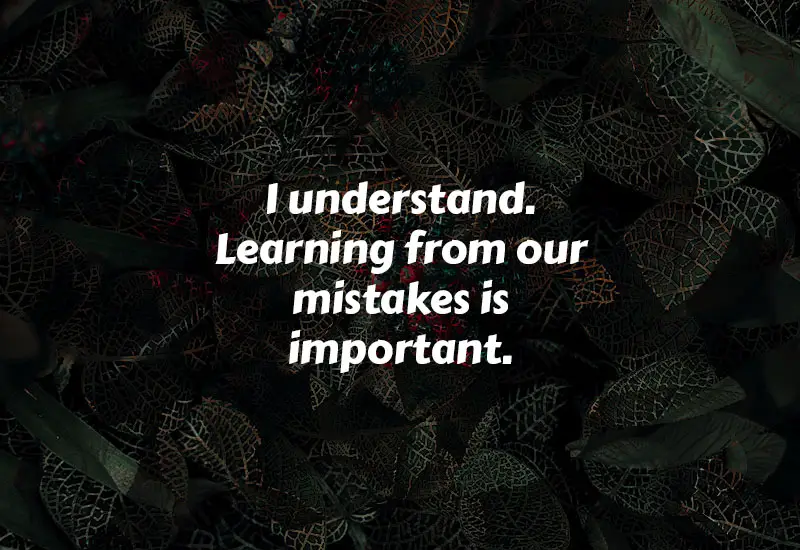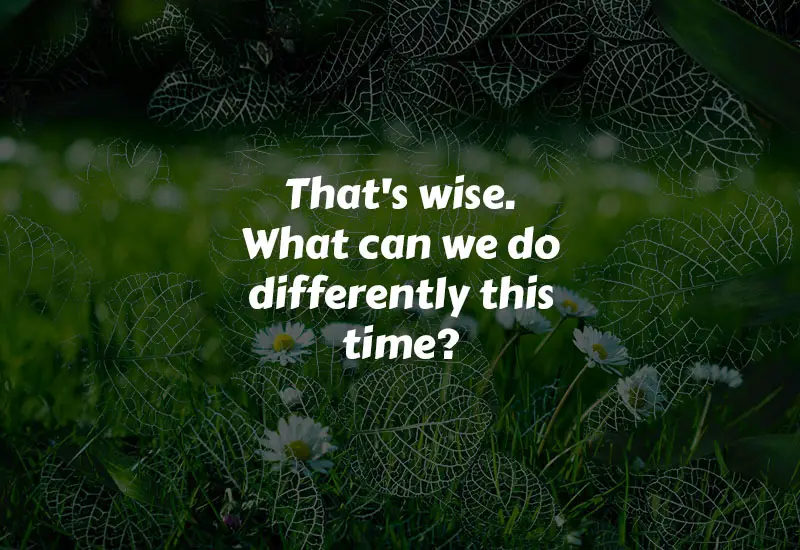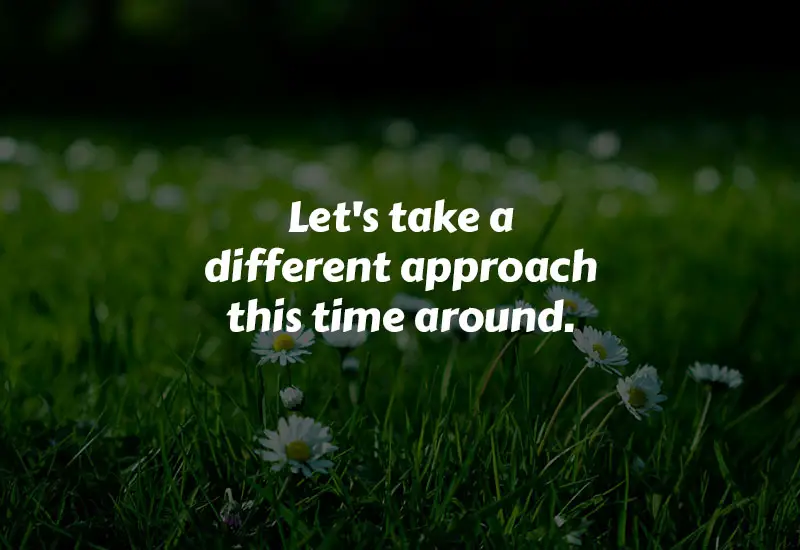Learn from your past mistakes and make sure to avoid repeating them in the future. We will explore effective strategies to help you break the cycle of making the same mistakes over and over again.
Making mistakes is a natural part of life, but it can be frustrating and disheartening when we find ourselves making the same mistakes repeatedly. Whether it’s in our personal or professional lives, the desire to learn from our mistakes and grow as individuals is universal.
Recognizing the need for change and taking proactive measures to prevent making the same mistakes again is crucial for personal growth and success. We will delve into effective strategies and techniques that can help break the cycle of repeating mistakes, allowing you to move forward with confidence and avoid the pitfalls of past errors.

22 Great Ways to Respond to I Don’t Want to Make The Same Mistake Again
- I understand. Learning from our mistakes is important.
- That’s wise. What can we do differently this time?
- Let’s take a different approach this time around.
- I hear you. Let’s avoid repeating history.
- It’s good to be cautious. How can we ensure a better outcome?
- Got it. Let’s make sure we’re on the right track.
- Agreed. Let’s not go down that road again.
- Let’s aim for progress, not repetition.
- I respect that. Let’s strive for improvement.
- Learning from past experiences is key.
- I’m with you. Let’s break the cycle.
- Let’s be mindful of what went wrong before.
- No problem. Let’s find a new approach.
- I’m on board. Let’s make a fresh start.
- Absolutely. Let’s avoid making the same mistake twice.
- I agree. Let’s chart a different course.
- Smart move. Let’s learn from the past and move forward.
- I support that decision. Let’s forge ahead with caution.
- It’s important to grow from our mistakes.
- I’m with you on that. Let’s try something new.
- We’ll be more careful this time around.
- Let’s aim for improvement, not repetition.
I Understand. Learning From Our Mistakes Is Important.

Learning from past mistakes is crucial for personal growth and development. By reflecting on our errors and understanding the reasons behind them, we can make better decisions in the future. It is important to approach situations with a mindset focused on improvement rather than dwelling on past failures.
Each mistake serves as a valuable lesson that contributes to our growth as individuals. Embracing these experiences allows us to evolve and make better choices moving forward. Remember that mistakes are a natural part of life and should be viewed as opportunities for learning and progress.
Also Read: 120+ Best Responses to I Appreciate You
That’s Wise. What Can We Do Differently This Time?

It’s important to take a different approach to avoid repeating past mistakes. By being mindful of our actions and making conscious choices, we can improve our future outcomes. Reflection and introspection are key in this process, as they allow us to identify where things went wrong and what changes can be made.
Embracing a new mindset and incorporating fresh strategies can lead to better results. Remember, growth comes from learning from our experiences and adapting accordingly. Let’s move forward with confidence and a willingness to evolve.
Let’s Take a Different Approach This Time Around

When looking to avoid making the same mistake again, it’s crucial to approach things differently this time. When crafting your content, You should avoid commonly overused words and phrases to keep your writing engaging. Additionally, to maintain the reader’s interest, it’s important to use a variety of phrases at the beginning of paragraphs and steer clear of repetitive terms.
When it comes to concluding your content, remember to skip the conclusion paragraph altogether. By implementing these guidelines, you can ensure that you are producing fresh and captivating content that resonates with your audience.
I Hear You. Let’s Avoid Repeating History.
I understand your concern about not wanting to repeat past mistakes. It’s important to be aware of our actions and learn from our experiences to avoid falling into the same patterns. By being mindful of our choices, we can pave the way for a better future.
Instead of using overused phrases and expressions, let’s strive for more original and engaging content. By varying our sentence starters and avoiding repetitive language, we can hold the reader’s attention and keep them interested in our message. Let’s focus on delivering valuable information and insights throughout the blog post, creating a seamless flow that doesn’t require a separate conclusion paragraph.
Together, we can ensure that we are not repeating history but instead making progress towards our goals.
It’s Good To Be Cautious. How Can We Ensure A Better Outcome?
It is always wise to exercise caution and ensure that we do not repeat past mistakes. To achieve a better outcome, we need to be mindful of certain guidelines. Firstly, it is important to avoid using commonly overused words and phrases that may dilute the impact of our message.
Secondly, we should strive to vary the expressions we use at the beginning of paragraphs, keeping the readers engaged and interested throughout. By selecting different phrases and approaches, we can maintain a fresh and engaging tone in our writing. Lastly, it is advisable to omit a conclusion paragraph, as it can sometimes feel repetitive and unnecessary.
By adhering to these guidelines, we can effectively respond to the desire of not making the same mistake again and work towards achieving a better outcome.
Got It. Let’s Make Sure We’re On The Right Track.
Certainly! It's crucial to steer clear of overused words and phrases to maintain a fresh and engaging writing style. By avoiding repetitive terms and introducing a variety of expressions at the beginning of paragraphs, you can easily sustain the reader's interest.
Moreover, it’s also essential to skip including a conclusion paragraph, as it can often appear unnecessary or redundant. By adhering to these guidelines, you can ensure that your writing is cohesive, engaging, and free from common linguistic pitfalls.
Agreed. Let’s Not Go Down That Road Again.

To effectively address the issue at hand and prevent repeating past errors, it is essential to conscientiously adhere to certain key principles. These guidelines serve as a roadmap to ensuring clarity and engaging the reader throughout the content.
By eschewing common and tiresome phrases that might detract from the message, one can maintain a fresh and dynamic writing style. Additionally, by diversifying the language used in the opening of paragraphs, the reader’s attention can be captivated and sustained.
Embracing these strategies will enhance the overall quality and impact of the content, enabling a more compelling and engaging narrative.
Let’s Aim For Progress, Not Repetition.
When faced with the prospect of making the same mistake again, it is crucial to shift our focus towards progress rather than falling into the cycle of repetition. By learning from past errors, we can adapt our approach and strive for improvement in our future endeavors.
Embracing growth and development, we can break free from the constraints of history and forge new paths forward. Through mindful reflection and intentional action, we have the power to transform our mistakes into valuable lessons that propel us towards success.
By cultivating a mindset centered on progress, we can move beyond the fear of repeating past errors and instead embrace the opportunity for growth and positive change.
I Respect That. Let’s Strive For Improvement.
Acknowledging past mistakes is an important step towards growth and progress. It shows a willingness to learn and improve. By avoiding repetitive language and choosing diverse expressions, we can keep our writing engaging. Let’s focus on presenting fresh perspectives and captivating our audience.
Omitting a conclusion can create an open-ended feel, encouraging continued contemplation. Embracing these guidelines can lead to more compelling and impactful content.
Learning From Past Experiences Is Key.
Learning from past experiences is essential in order to avoid making the same mistakes again. It allows us to reflect on our actions and decisions, understanding what went wrong and how we can improve. By analyzing our past experiences, we gain valuable insights that guide us towards making better choices in the future.
It is important to approach this process with careful consideration and open-mindedness. Instead of using commonly overused words and phrases that can lead to repetitive content, strive for variety in your writing. Engage your readers by starting paragraphs with different expressions that maintain their interest.
By omitting a conclusion paragraph, you encourage readers to draw their own conclusions from the information provided. Embrace the opportunity to learn, grow, and create exceptional content that resonates with your audience.
I’m With You. Let’s Break The Cycle.
I understand your desire to move forward and not repeat past mistakes. Breaking the cycle is a courageous decision, and I’m here to support you on this journey. To ensure effective communication, it’s important to avoid using commonly overused words and phrases.
By doing so, we can bring freshness to our sentences and prevent monotony from setting in. Additionally, using a variety of phrases at the beginning of each paragraph will captivate the reader’s attention and maintain their interest throughout the article.
Instead of following a predictable pattern, we will explore different expressions to convey our message effectively. As we embark on this mission together, we will refrain from including a conclusion paragraph, allowing our thoughts to seamlessly flow and giving the readers the freedom to draw their own conclusions.
Remember, we are committed to breaking the cycle and embracing a new, improved path.
Let’s Be Mindful Of What Went Wrong Before.
When faced with the need to refrain from repeating past mistakes, it's essential to approach the situation with mindfulness. This involves reflecting on past errors and understanding the patterns that led to those missteps. By doing so, we can gain insights into how to make informed decisions and take different actions this time around.
It’s important to consider what has gone wrong in the past and to be mindful of the choices that led to those outcomes. This mindfulness can prompt us to seek new approaches and make wiser decisions, thereby avoiding the repetition of previous mistakes.
By being conscious of our past missteps, we can pave the way for a more successful and fulfilling journey ahead.
No Problem. Let’s Find A New Approach.
It’s essential to approach things differently this time around. By focusing on unique and varied expressions in your writing, you can better engage your audience and maintain their interest. Avoiding commonly overused words and phrases will elevate the quality of your content.
Remember, each paragraph should start with a fresh perspective to keep readers hooked until the very end. By following these guidelines, you can effectively convey your message and connect with your audience on a deeper level.
I’m On Board. Let’s Make A Fresh Start.
It’s essential to approach the situation with a fresh perspective and a willingness to learn from past errors. By embracing a new beginning, you can proactively work towards avoiding similar mistakes and creating better outcomes in the future. Acknowledging the need for change is the first step towards growth and self-improvement.
By being open to new possibilities and approaches, you can pave the way for a more positive and successful journey ahead. Remember that every setback is an opportunity to learn and grow, and by responding positively and proactively, you can set yourself on a path towards success and achievement.
Absolutely. Let’s Avoid Making The Same Mistake Twice.
When facing a situation where you don’t want to repeat the same mistake, it’s crucial to approach it with a strategic mindset. It’s essential to be mindful of the language used, ensuring that the content remains engaging and avoids repetitive phrases.
By implementing a diverse range of expressions, the reader’s interest can be sustained throughout the entirety of the material. This thoughtful approach should also extend to the structure of the content, ensuring that it concludes seamlessly without a dedicated summary paragraph.
By adhering to these guidelines, the risk of repeating any previous errors can be effectively mitigated, creating a more engaging and impactful piece of content.
I Agree. Let’s Chart A Different Course.
Certainly! When it comes to moving forward from past mistakes, it is important to acknowledge that we don’t want to repeat them. Instead, let’s take a different path and chart a new course. In order to effectively communicate our intentions, we should be mindful of our language choices.
By avoiding commonly overused words and phrases, we can ensure that our message remains fresh and engaging. Additionally, it’s important to vary the beginnings of our paragraphs to captivate the reader’s attention throughout the entire piece. By employing different expressions and steering clear of repetition, we can maintain their interest.
As for a conclusion paragraph, it is not necessary in this context. So let’s approach this journey of growth and change with determination, avoiding previous mistakes, and striving for success.
Smart Move. Let’s Learn From The Past And Move Forward.
Responding to the sentiment “I don’t want to make the same mistake again” is a wise move. By reflecting on our past experiences, we can gain valuable insights and prevent repetition of errors. To ensure effective communication in our writing, there are three essential guidelines to consider.
Firstly, it’s important to avoid using commonly overused words and phrases that can make our writing sound clichéd or repetitive. Secondly, we should strive to vary the phrases and expressions used at the beginning of each paragraph, keeping the reader engaged and interested.
Lastly, it’s best to forgo including a conclusion paragraph, allowing the main points of the article to speak for themselves. By adhering to these guidelines, our writing can become more impactful and engaging, ensuring our message is effectively conveyed without any unnecessary or overused phrases.
By learning from our past mistakes and implementing these strategies, we can move forward confidently and avoid repeating the same errors.
I Support That Decision. Let’s Forge Ahead With Caution.
Certainly! Making mistakes is a part of life, but learning from them is what truly matters. It’s understandable to want to avoid repeating past errors. Moving forward with caution and mindfulness is essential for personal growth and success. By being proactive and mindful of our actions, we can navigate through life’s challenges with wisdom and resilience.
Embracing a thoughtful approach enables us to make more informed decisions and avoid unnecessary setbacks. Let’s recognize the significance of learning from our past experiences and use that knowledge to steer our future endeavors in a positive direction.
It’s Important To Grow From Our Mistakes.
It’s crucial to learn and progress from our past errors. Each mistake presents an opportunity for growth and self-improvement. By reflecting on our missteps, we can glean valuable insights and avoid repeating the same blunders in the future. Embracing our mistakes with a growth mindset not only empowers us to make better decisions but also fosters personal development and resilience.
Remember that everyone makes mistakes; what truly matters is how we choose to respond and learn from them. The journey of self-improvement is ongoing, and each setback serves as a stepping stone towards a more enlightened and refined version of ourselves.
I’m With You On That. Let’s Try Something New.
It’s understandable if you want to move away from past errors. Embracing a fresh approach can lead to new opportunities and growth. Don’t feel pressured to reuse the same language patterns repeatedly; diversity can engage your audience more effectively. By exploring unique ways to start your sentences, you can captivate readers’ attention and keep them interested throughout your content.
Remember, the journey of improvement never truly concludes; every step forward brings new insights and possibilities.
We’ll Be More Careful This Time Around.
In response to your concerns about making the same mistake again, we understand the importance of being more cautious moving forward. It’s essential to learn from our past errors and take proactive measures to avoid repeating them. By implementing thorough analysis and evaluation of our decisions, we can mitigate the risk of encountering similar pitfalls in the future.
Our commitment to learning and growing from our experiences will guide us in making informed choices and maintaining a vigilant approach. We are dedicated to fostering an environment of continuous improvement and accountability to ensure that we are more deliberate and calculated in our actions.
Let’s Aim For Improvement, Not Repetition.
When faced with the desire to avoid repeating our mistakes, it is essential to focus on progress rather than relapse. By consciously adhering to these three essential guidelines, we can cultivate continuous improvement. Firstly, we must refrain from initiating sentences with overused words and phrases.
Instead, diversify our language choices to captivate the reader’s attention from the start. Secondly, employing an array of expressions at the beginning of each paragraph prevents monotony and sustains the reader’s engagement throughout the piece. Lastly, it is crucial to omit a traditional conclusion paragraph, allowing the ideas to culminate naturally instead.
Embracing these strategies will equip us with the tools necessary to break free from the cycle of repeating mistakes and foster personal growth.
Conclusion
In life, we all make mistakes, and it’s okay. Embrace the learning experiences and use them to grow. By being mindful of our actions and making conscious choices, we can avoid repeating the same mistakes. Remember, it’s never too late to change and create a better future for ourselves.









